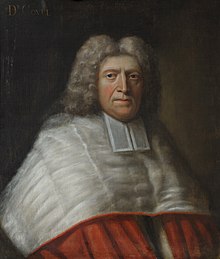|
John Covel
 John Covel (2 April 1638 – 19 December 1722) was a clergyman and scientist who became Master of Christ's College, Cambridge and vice-chancellor of the University.[1] DiplomacyBorn at Horningsheath, Suffolk, the son of William Covel, John Covel was educated at Bury St Edmunds school and Christ's College, Cambridge, where he was made a fellow in 1659.[2] In 1670 he went to Constantinople as Chaplain to the Levant Company. For two years he was in sole charge of the English Embassy there after the previous ambassador died.[3] Travel and ScholarshipCovel travelled widely in Asia Minor and described the buildings and plants which he saw. He purchased many Greek manuscripts (including codices 65, 110, 321, 322, and ℓ 150). After his return, Covel spent the winter of 1680/1681 in Suffolk suffering with fever,[4] before becoming Chaplain to the Princess of Orange in The Hague (1681–1685). He was then elected the 15th Master of Christ's in 1688, a position he held until 1723.[5] In his later years, Covel helped to develop the study of fossils.[6] References
Further reading
|